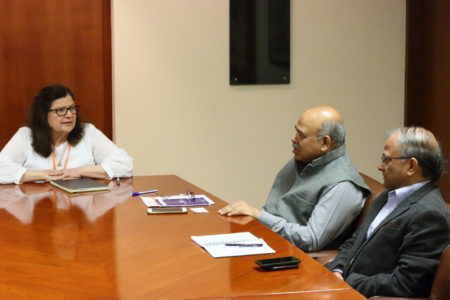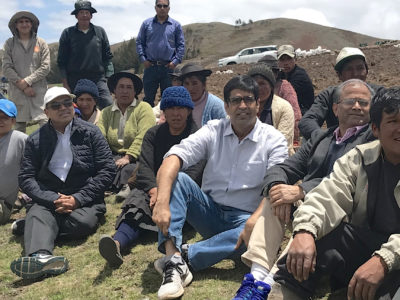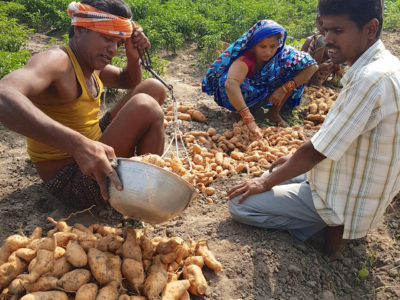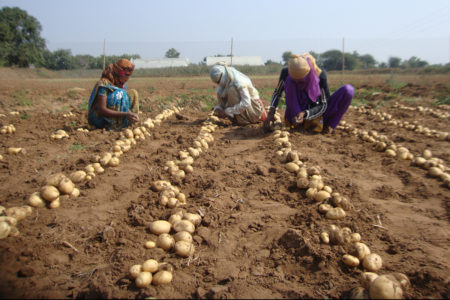
The International Potato Center (CIP) is involved in projects in several parts of India, but government officials who recently visited CIP headquarters in Peru say there is great potential for expanding such collaboration.
“We want a more robust cooperation between CIP and our national research institution, the Indian Council of Agricultural Research (ICAR),” said Dr. Shobhana Kumar Pattanayak, Secretary of Agriculture and Cooperation at India’s Ministry of Agriculture and Farmers’ Welfare. “We want to build a blueprint for the future as far as potato and sweetpotato are concerned.”
Pattanayak recently visited CIP’s headquarters in Lima and an experimental station in Huancayo together with Dr. Anand Kumar Singh, ICAR Deputy Director General for Horticulture and Crops, and Dr. Samarendu Mohanty, CIP’s Regional Director for Asia. Singh and Pattanayak lauded CIP’s collaboration with India in recent years and expressed hope that the Center’s contributions to food security, nutrition and economic opportunities in India will increase in the future.
Improving incomes
India is the world’s second biggest potato producer, after China, and potato is India’s third most important crop after rice and wheat, which means it has great potential for improving food security and farmer incomes. CIP has been active in India since 1975 and has shared more than 1,100 potato clones with the country’s Central Potato Research Institute.

Singh explained that the Indian government has released nine CIP-related potato varieties over the past two decades, two of which are vital for the country’s fast-expanding processed potato sector. Known as Kufri Chipsona-1 and Kufri Chipsona-3, those varieties are now grown on more than 150,000 hectares and are used for producing chips, crisps and other products. Revenue from potato products in India is estimated to be USD 3.4 billion in 2018 and is expected to grow at a rate of 6.5 percent annually in the coming years.
The latest addition to India’s list of improved potato varieties is CIP-bred Kufri Lima, a heat-tolerant, virus-resistant potato that was recommended for release in 2017 and was recently approved as a new variety. “We expect that Kufri Lima will be popular for both fresh consumption and processed markets and are hopeful that it will help to transform the potato economy in India,” said Singh.
Unlike previous CIP-related varieties, which resulted from crosses between CIP and Indian breeding clones, Kufri Lima was selected from a group of late blight and virus resistant potatoes that were bred and evaluated in Peru before being sent to India in 2006. According to CIP scientist Dr. Mohinder Kadian, this sped up the process of evaluating and selecting Kufri Lima as a candidate variety in India. He added that Kufri Lima was also the first Indian potato variety chosen through a participatory varietal selection approach, ensuring that it has the characteristics that farmers and consumers want.
“Potato is a winter crop in India, planted in the late fall, and because Kufri Lima tolerates high temperatures, farmers can plant it 20 to 30 days earlier than other local varieties,” explained Mohanty. “Additionally, because it is ready to harvest 80 to 90 days after planting – sooner than most varieties – farmers who grow Kufri Lima can sell their crop when potatoes are scarce and market prices are 40 to 50 percent higher than during peak harvest. This also makes farmland available for planting a second winter crop, such as wheat, rice or vegetables, which can further improve farmer incomes.”
Confronting malnutrition

In 2018, CIP sent 57 biofortified potato clones with high levels of iron and zinc to ICAR for evaluation and use in breeding. CIP-bred biofortified potatoes are already being grown and eaten by farmers in Peru, and they are being tested in several other countries.
“Indians love potatoes, so biofortified potatoes could be an easy way to address the problem of malnutrition,” Pattanayak said. “It is heartening to note that CIP has developed these varieties. We would like to introduce them as quickly as possible.”
Pattanayak also noted that a CIP-led project is already disseminating a biofortified orange-fleshed sweetpotato variety in Odisha state, where it has great potential for reducing vitamin A deficiency – a cause of childhood blindness and other serious health problems. The FAO has estimated that 62 percent of Indian children are at risk of vitamin A deficiency, whereas India’s 2015-16 National Health Survey results indicate that 58 percent are anemic.
“We have feeding programs in the schools and preschools where both sweetpotato and potato could be very helpful to address the burning issue of hidden hunger in our country,” he said.
Climate-smart potatoes
Kadian explained that as part of an All India Coordinated Research Project, ICAR is currently evaluating two CIP-bred, drought-tolerant clones for possible release as new varieties. One of them is an early maturing, red-skinned potato that is ready for harvest 75 days after planting, which would be ideal for incorporation into grain farming systems in the highlands of northeast and northwest India. He added that he hopes ICAR will continue to evaluate CIP-bred and selected potato clones in the future, because it can speed up the process of getting climate change-resilient varieties to farmers.
According to Kadian, an advantage of many potato clones that CIP has shared with ICAR, such as Kufri Lima, is their virus resistance, which allows farmers to save seed potatoes from their own harvest for planting, and spares them having to buy new seed potatoes every year. Most Indian varieties rapidly accumulate viruses in lowland regions, which reduce yields from one planting cycle to the next.
“Farmers in the non-traditional potato producing states of Central India have to purchase disease-free seed potatoes from producers in Northern India every year. But farmers who grow Kufri Lima can wait two or three years before they need to purchase clean seed, which means they earn more money,” Kadian said.
“We are hopeful that Pattanayak and Singh’s recent visit to Peru will further strengthen collaboration between CIP and Indian research institutions for the development of potato and sweet potato in the country,” said Mohanty.

